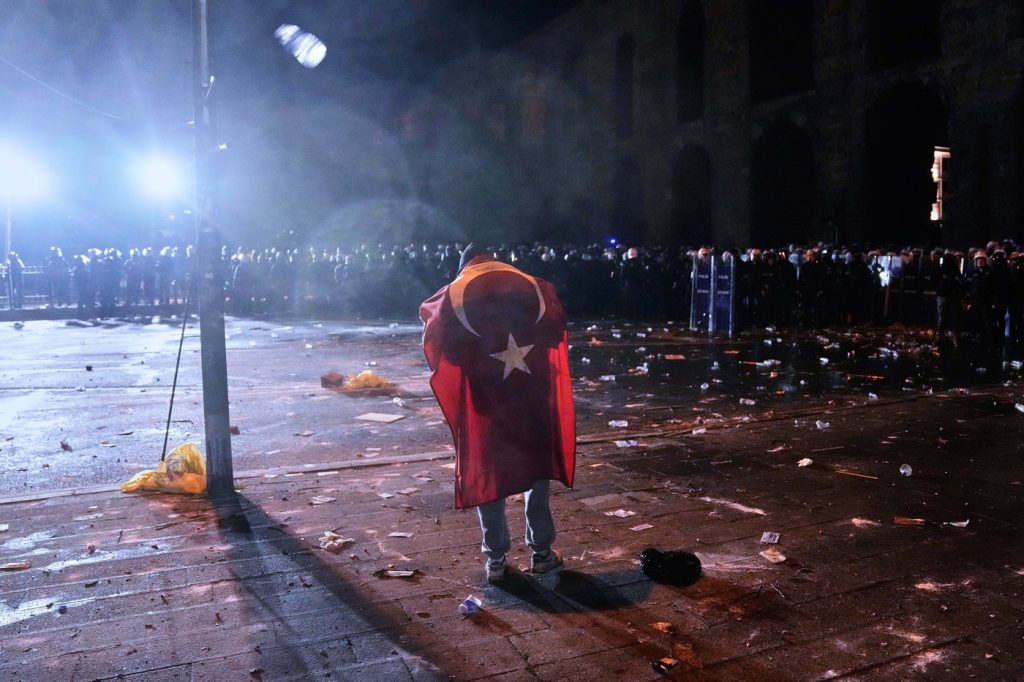ISTANBUL (AP) Ekrem Imamoglu, the Mayor of Istanbul, faced police questioning on terror-related charges on Saturday, following a prior interrogation regarding corruption allegations. His arrest earlier this week triggered widespread protests throughout Turkey, with demonstrators mobilizing in various cities to express their dissent.
Interior Minister Ali Yerlikaya announced via social media that a total of 343 suspects had been detained during protests in several major cities on Friday night. Yerlikaya emphasized, "There will be no tolerance for those who seek to violate societal order, threaten the people's peace and security, and pursue chaos and provocation." The cities impacted by these protests included Istanbul, Ankara, Izmir, Adana, Antalya, Çanakkale, Eskişehir, Konya, and Edirne.
Imamoglu, a prominent opposition figure and a potential contender against President Recep Tayyip Erdogan in the upcoming presidential elections scheduled for 2028, was arrested on Wednesday after a dawn raid on his home over allegations of financial misconduct and links to Kurdish militants. Alongside him, numerous other high-profile individuals, including two district mayors, were also detained.
The arrest is largely perceived as a politically motivated effort to eliminate a significant opposition figure. Government officials, however, vehemently deny these claims, asserting that the actions taken against opposition figures are based purely on legal grounds and asserting the independence of Turkey's judiciary.
On Friday, during a four-hour session, police interrogated Imamoglu regarding the corruption allegations, where he categorically denied all charges. Reports indicated that he was expected to be taken to a courthouse for further questioning by prosecutors later on Saturday, with the possibility of facing formal charges.
The backlash against the mayor's arrest has sparked increasingly intense protests. In Istanbul, police responded to demonstrators using pepper spray, tear gas, and rubber bullets as they attempted to breach a barricade near the city's historic aqueduct. Protesters retaliated by throwing flares, stones, and other objects at the police. Law enforcement also dispersed protests outside city hall for three consecutive nights following a supportive speech from Ozgur Ozel, leader of the Republican People’s Party.
Similar crackdowns occurred in Ankara and Izmir, where police utilized forceful tactics to break up gatherings, as seen in various television broadcasts. Thousands joined protests in other cities, rallying for the government's resignation.
President Erdogan condemned the protests, asserting that the government would not accept civil unrest and accused the opposition of links to corruption and terrorist organizations. In a notable move, authorities in both Ankara and Izmir imposed a five-day ban on demonstrations, mirroring previous restrictions enacted in Istanbul.
Erdogan characterized the actions in Istanbul as an anti-corruption operation being manipulated to incite public disorder. He stated, "I want it to be known that we will not allow a handful of opportunists to bring unrest to Turkey just to protect their plundering schemes."
Imamoglu’s detention coincided with an anticipated nomination for the Republican People’s Party’s presidential candidacy, expected to take place during a primary on Sunday. Party leader Ozel confirmed that the primary would proceed as scheduled, allowing approximately 1.5 million delegates to cast votes. Additionally, the opposition has encouraged citizens to participate in a symbolic election on the same day using improvised ballot boxes set up across Turkey to demonstrate solidarity with Imamoglu.
On Saturday, Imamoglu took to social media, labeling his arrest as a "coup" and accusing the government of misusing the judicial system and exacerbating the nation's already delicate economic situation. He expressed confidence that, with public support, they would first overcome this coup and subsequently hold accountable those responsible for the situation.










